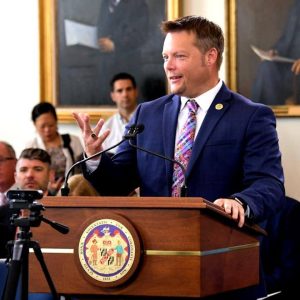The Worcester County Commissioners have tasked Maryland’s new rural economic strategy director with communicating concerns about wind and solar initiatives and the potential impacts on agriculture and tourism.

Carl Anderton, the state’s new director of rural economic strategy, is pictured.
Photo courtesy Carl Anderton
By Bethany Hooper, Associate Editor
Local officials this week tasked Maryland’s new rural economic strategy director with communicating Worcester County’s concerns regarding wind and solar initiatives and the impacts they could have on agriculture and tourism.
On Tuesday, former Republican delegate Carl Anderton came before the Worcester County Commissioners in his new role as the director of rural economic strategy for the state of Maryland. Appointed by Democratic Gov. Wes Moore’s administration to advise on economic growth opportunities in rural communities, Anderton said he will be working with local governments to voice concerns and share ideas.
“The governor wants to know what’s going on in these areas of the state,” he told the commissioners. “He wants a centralized focus solely on the rural parts of the state to find out what the state is doing well, what we can do better, and how the state can get out of the way. So my goal was to take ideas from you … and take those to the governor and see what we can do to help economies thrive in all parts of the state.”
Commissioner Chip Bertino kicked off Tuesday’s discussion by welcoming Anderton in his new capacity. He said he believed that rural counties such as Worcester were often overlooked and questioned how Anderton would advocate for local communities.
“My impression is that the rural counties are often ignored by the state and by the governor and by the legislature. The needs that we have, the concerns that we have, often fall on deaf ears when it comes to solar, when it certainly comes to windmills off the coast,” he said. “What is your expectation for success in articulating the needs and concerns of the rural counties, and that you’ll find a receptive ear, not just one that listens but one that actually acts?”
Anderton said it was something they would find out together. However, he said his years as a state delegate, working across party lines to support his constituents, would serve him well in his new role.
“The governor wants a direct line of communication – I guess through me – and so we’re going to do that,” he replied. “We’re going to take ideas up there, concerns about offshore wind, solar, whatever the concerns are.”
Commissioner Joe Mitrecic said he was concerned about the cost of doing business. He said he had read where Maryland was second to California in terms of business climate.
“I mean how can we continue to try to increase economic development and have businesses come to Maryland when it costs them the second most in the country?” he asked.
Anderton said it was a valid point and one that he would share with the governor.
“The goal is whatever ideas you have, let’s take them to the governor,” he said. “We have that conduit now, to take those ideas and see what will be acted upon.”
Commissioner Ted Elder, however, said he was most concerned about state control over large-scale solar projects, as well as the proposed offshore wind project.
“Our number one industry is agriculture and our number two is tourism,” he said, “and we’re the only county in the state that’s being attacked – by the state – on both of those fronts.”
In recent years, commissioners have expressed concerns regarding solar projects being developed on prime agricultural lands. Currently, county code permits utility scale solar systems in several zoning districts, so long as the lot exceeds 50 acres. However, the Maryland Public Service Commission has the ultimate authority on projects more than two megawatts.
“The state, anything over two megawatts, is taking total control of it as far as zoning, all the regulations,” he said, and we’re receiving basically nothing in return for that.”
Elder said he wanted to see the county have some control on where large-scale solar projects were placed. He added that the county received no tax benefit when agricultural land was converted to solar farms.
“We get the headaches and the worries from it, but we get no benefit as a county government,” he said.
Anderton said he would continue to work with county leaders. He said he would also attend meetings for the Maryland Association of Counties.
